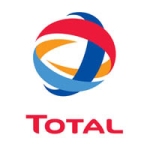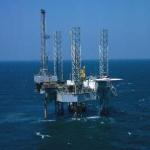 Total SA (NYSE – TOT), France’s largest company, announced the highest annual net profit in French corporate history last week, sounding a rare positive note in todays grim financial meltdown. In 2008 the firm made a profit of €13.9 Bn ($18.0 Bn) thanks to record oil prices in the first half of the year, which helped offset the second half collapse in oil prices. Profits began to fall in the fourth quarter of 2008 as the credit crunch hit demand, sending crude prices tumbling. Total is now preparing for the future by investing in increased capacity in new fields, especially in Africa & the Middle East, whilst putting the brakes on production in Canada & the North Sea.
Total SA (NYSE – TOT), France’s largest company, announced the highest annual net profit in French corporate history last week, sounding a rare positive note in todays grim financial meltdown. In 2008 the firm made a profit of €13.9 Bn ($18.0 Bn) thanks to record oil prices in the first half of the year, which helped offset the second half collapse in oil prices. Profits began to fall in the fourth quarter of 2008 as the credit crunch hit demand, sending crude prices tumbling. Total is now preparing for the future by investing in increased capacity in new fields, especially in Africa & the Middle East, whilst putting the brakes on production in Canada & the North Sea.
“Unprecedented volatility marked the 2008 market environment,” said Total chief executive Christophe de Margerie, noting that oil had peaked at about $150 a barrel last year before plunging to as low as $35
With regards to its North Sea operations, Total has reviewed its capital expenditure for 2009 due to the fall in oil prices. Senior vice president for Northern Europe, Michel Contie, remarked that an oil price of $40 per barrel was required to realistically develop new fields in the North Sea, as many new offshore discoveries are “not economic today.” The Joslyn & Surmont heavy-oil ventures in the Canadian Athabasca project are among the “building blocks” for boosting output from 2016, the oil sands projects are expected to provide Total with almost 300,000 barrels a day of production capacity by 2020, as reported by Bloomberg : Total is “reevaluating costs, technologies, structure and timing of Canadian projects”
In a recent aggressive move, Total has offered to buy Canadian oil-sands explorer UTS Energy Corp for $ 617 million Canadian ($505 million), which rejected the bid as “inadequate.” UTS has advised shareholders that the bid should be rejected, as the book value of the company is pegged at twice the unsolicited offer. Total reiterated today that oil sands need crude prices at $80 a barrel for investment, which to my mind displays that they are looking to bank up potential reserves for a time when oil demand will flip to the upside. Until then, Total looks as though it is banking on emerging markets to provide the spur to growth for the forseeable future.
In Nigeria, Total is the lead company in the Apko offshore oil field, where it is partnered with MSV’s favourite oil firm, Petrobras (NYSE – PBR) & state-owned Nigeria National Petroleum Corporation, the field is estimated to have reserves of up to 1.6 billion barrels of sweet crude in reserve. In order to help fund the project, the three existing shareholders agreed to auction off a 45% stake in the field to Indias state controlled ONGC for an estimated $2 Bn.
In Yemen, Total will soon start shipping liquefied natural gas from the Gulf of Aden, bringing into operation a $4 billion project begun less than four years ago. The shipments will make Yemen the newest member of the world’s small club of gas exporters & should earn the government as much as $50 billion in tax revenue over the next 25 years.
In Angola, as discussed in a previous post, Total is set to continue with a $9 billion investment to raise production, despite the huge drop in crude prices since July last year. In a joint venture with Chevron (NYSE – CVX) & others, the Tombua-Landana oil field is expected to come online, contributing a further 120,000 bpd to Totals existing operations. Meanwhile, Total’s third production hub in Angola’s offshore Bloc 17, is expected to begin pumping oil from depths of up to 1,200 metres,beginning in 2011, according to the company’s website. Presently, Total is the third biggest oil producer in Angola after Exxon & Chevron, pumping over 500,000 barrels per day.
During his presentation lat week, CEO de Margerie stated that Total is also interested in entering the upstream sector in Brazil, particlualrly in offshore projects such as the Santos basin and is also eying new acreage in Venezuela.
“We have had discussions with Petrobras and told them officially that we would be interested either in entering existing discoveries or taking part in the next bids on new acreage,” de Margerie told reporters at a briefing in London.
He stressed that Petrobras needed financing to develop the reserves in the offshore basin, but that Total was not interested in merely becoming a financial partner in Brazil. De Margerie also said Total would be interested in bidding for new exploration acreage in the extra heavy crude oil Orinoco Belt in Venezuela.
“There is room for additional development & we will be one of the companies to get access to the bid data, and we may bid,” he said. “We need to operate in Venezuela in good conditions, but it is an important target in terms of acreage” .
De Margerie said Total was right to stay in Venezuela despite the nationalization by President Hugo Chavez of large swathes of the country’s oil industry in 2007. Chavez nationalized oil fields when crude prices were on what looked like an unstoppable bull run, and as a result ExxonMobil and ConocoPhillips left Venezuela and are still runiing legal battles over disputed projects. It was reported earlier this year that Venezuela is now looking for new bids to develop fields from both global majors and state-run oil companies. Total which saw its stake in the Sincor project reduced from 47% to 30.3% in Chavez’s ambitious move remains committed to the project.
“We have to make sure our existing Sincor project delivers–this is still a real challenge,” he said.
Looking at Total from an independent viewpoint, it is obvious the management are playing a canny game. We have seen them exit or scale down high cost projects, such as Saudi Arabia, UK & Canada, whilst at the same time, investing heavily in emerging market prospects, as is clear from this article. What also impresses me about this company is its track record of working well with IOCs such as Chevron as well as local state entities & as long as it continues with this “nimble” approach along with a prudent focus on legacy operations, the future looks very bright indeed.
 Whilst having previously discussed the Byzantine workings of Russia’s energy players in
Whilst having previously discussed the Byzantine workings of Russia’s energy players in  Like many developing nations with vast natural resources, Nigeria has seen a massive influx in Foreign Direct Investment (FDI), particularly in the energy sector. However, civil unrest, particularly in the Niger Delta, may be a catalyst for potential investors to look to other West African Nations as investment opportunities. Added to this are the ever present problems of ineptitude & “graft” within both state & federal government, which has brought some unwelcome news for Africa’s largest economy.
Like many developing nations with vast natural resources, Nigeria has seen a massive influx in Foreign Direct Investment (FDI), particularly in the energy sector. However, civil unrest, particularly in the Niger Delta, may be a catalyst for potential investors to look to other West African Nations as investment opportunities. Added to this are the ever present problems of ineptitude & “graft” within both state & federal government, which has brought some unwelcome news for Africa’s largest economy.